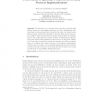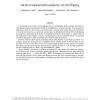659 search results - page 15 / 132 » Compiling and securing cryptographic protocols |
104
click to vote
CCS
2008
ACM
15 years 4 months ago
2008
ACM
As cryptographic protocols execute they accumulate information such as values and keys, and evidence of properties about this information. As execution proceeds, new information b...
121
click to vote
CCS
2001
ACM
15 years 7 months ago
2001
ACM
hfulness of Abstract Protocol Analysis: Message Authentication∗ Joshua D. Guttman F. Javier Thayer Lenore D. Zuck December 18, 2002 Dolev and Yao initiated an approach to studyi...
111
click to vote
TARK
2007
Springer
15 years 8 months ago
2007
Springer
We introduce (i) a general class of security protocols with private channel as cryptographic primitive and (ii) a probabilistic epistemic logic to express properties of security pr...
120
click to vote
ACNS
2009
Springer
15 years 9 months ago
2009
Springer
Abstract. Two-party Secure Function Evaluation (SFE) is a very useful cryptographic tool which allows two parties to evaluate a function known to both parties on their private (sec...
147
click to vote
FOCS
2010
IEEE
15 years 14 days ago
2010
IEEE
Coin flipping is one of the most fundamental tasks in cryptographic protocol design. Informally, a coin flipping protocol should guarantee both (1) Completeness: an honest executi...


